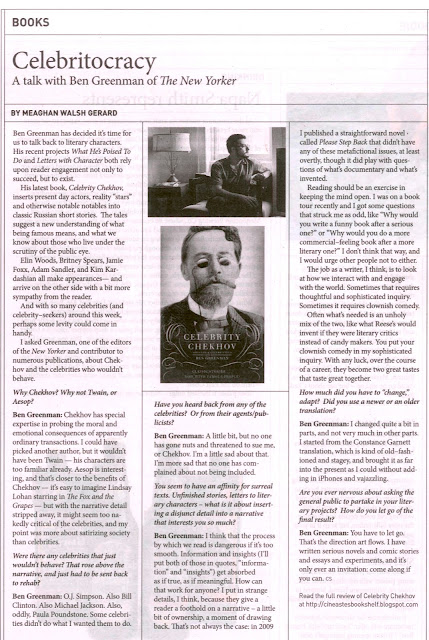About “Celebrity Chekhov”
As published in Connect Savannah, November 3, 2010.
Ben Greenman has decided it’s time for us to talk back to literary characters. His recent projects What He’s Poised To Do and Letters with Character both rely upon reader engagement not only to succeed, but to exist.
His latest book, Celebrity Chekhov, inserts present day actors, reality “stars” and otherwise notable notables into classic Russian short stories. The tales suggest a new understanding of what being famous means, and what we know about those who live under the scrutiny of the public eye.
Elin Woods, Britney Spears, Jamie Foxx, Adam Sandler, and Kim Kardashian all make appearances— and arrive on the other side with a bit more sympathy from the reader.
And with so many celebrities (and celebrity–seekers) around this week, perhaps some levity could come in handy.
I asked Greenman, one of the editors of the New Yorker and contributor to numerous publications, about Chekhov and the celebrities who wouldn’t behave.
Why Chekhov? Why not Twain, or Aesop?
Ben Greenman: Chekhov has special expertise in probing the moral and emotional consequences of apparently ordinary transactions. I could have picked another author, but it wouldn’t have been Twain — his characters are too familiar already. Aesop is interesting, and that’s closer to the benefits of Chekhov — it’s easy to imagine Lindsay Lohan starring in The Fox and the Grapes — but with the narrative detail stripped away, it might seem too nakedly critical of the celebrities, and my point was more about satirizing society than celebrities.
Were there any celebrities that just wouldn’t behave? That rose above the narrative, and just had to be sent back to rehab?
Ben Greenman: O.J. Simpson. Also Bill Clinton. Also Michael Jackson. Also, oddly, Paula Poundstone. Some celebrities didn’t do what I wanted them to do.
Have you heard back from any of the celebrities? Or from their agents/publicists?
Ben Greenman: A little bit, but no one has gone nuts and threatened to sue me, or Chekhov. I’m a little sad about that. I’m more sad that no one has complained about not being included.
You seem to have an affinity for surreal texts. Unfinished stories, letters to literary characters – what is it about inserting a disjunct detail into a narrative that interests you so much?
Ben Greenman: I think that the process by which we read is dangerous if it’s too smooth. Information and insights (I’ll put both of those in quotes, “information” and “insights”) get absorbed as if true, as if meaningful. How can that work for anyone? I put in strange details, I think, because they give a reader a foothold on a narrative – a little bit of ownership, a moment of drawing back. That’s not always the case: in 2009 I published a straightforward novel called Please Step Back that didn’t have any of these metafictional issues, at least overtly, though it did play with questions of what’s documentary and what’s invented.
Reading should be an exercise in keeping the mind open. I was on a book tour recently and I got some questions that struck me as odd, like “Why would you write a funny book after a serious one?” or “Why would you do a more commercial–feeling book after a more literary one?” I don’t think that way, and I would urge other people not to either.
The job as a writer, I think, is to look at how we interact with and engage with the world. Sometimes that requires thoughtful and sophisticated inquiry. Sometimes it requires clownish comedy.
Often what’s needed is an unholy mix of the two, like what Reese’s would invent if they were literary critics instead of candy makers. You put your clownish comedy in my sophisticated inquiry. With any luck, over the course of a career, they become two great tastes that taste great together.
How much did you have to “change,” adapt? Did you use a newer or an older translation?
Ben Greenman: I changed quite a bit in parts, and not very much in other parts. I started from the Constance Garnett translation, which is kind of old–fashioned and stagey, and brought it as far into the present as I could without adding in iPhones and vajazzling.
Are you ever nervous about asking the general public to partake in your literary projects? How do you let go of the final result?
Ben Greenman: You have to let go. That’s the direction art flows. I have written serious novels and comic stories and essays and experiments, and it’s only ever an invitation: come along if you can.
Read my review of Celebrity Checkhov here.

